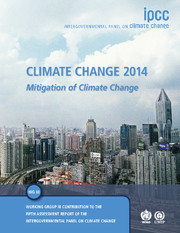 Climate Change 2014: Mitigation of Climate Change
Climate Change 2014: Mitigation of Climate Change Preface
from Foreword, Preface, Dedication and In Memoriam
Published online by Cambridge University Press: 05 February 2015
Summary
The Working Group III contribution to the Fifth Assessment Report (AR5) of the Intergovernmental Panel on Climate Change (IPCC) provides a comprehensive and transparent assessment of the scientific literature on climate change mitigation. It builds upon the Working Group III contribution to the IPCC's Fourth Assessment Report (AR4) in 2007, the Special Report on Renewable Energy Sources and Climate Change Mitigation (SRREN) in 2011 and previous reports and incorporates subsequent new findings and research. The report assesses mitigation options at different levels of governance and in different economic sectors. It evaluates the societal implications of different mitigation policies, but does not recommend any particular option for mitigation.
Approach to the assessment
The Working Group III contribution to the AR5 explores the solution space of climate change mitigation drawing on experience and expectations for the future. This exploration is based on a comprehensive and transparent assessment of the scientific, technical, and socio-economic literature on the mitigation of climate change.
The intent of the report is to facilitate an integrated and inclusive deliberation of alternative climate policy goals and the different possible means to achieve them (e. g., technologies, policies, institutional settings). It does so through informing the policymakers and general public about the practical implications of alternative policy options, i.e., their associated costs and benefits, risks and trade-offs.
During the AR5 cycle, the role of the Working Group III scientists was akin to that of a cartographer: they mapped out different pathways within the solution space and assessed potential practical consequences and trade-offs; at the same time, they clearly marked implicit value assumptions and uncertainties. Consequently, this report may now be used by policymakers like a map for navigating the widely unknown territory of climate policy. Instead of providing recommendations for how to solve the complex policy problems, the report offers relevant information that enables policymakers to assess alternative mitigation options.
- Type
- Chapter
- Information
- Climate Change 2014: Mitigation of Climate ChangeWorking Group III Contribution to the IPCC Fifth Assessment Report, pp. ix - xiiPublisher: Cambridge University PressPrint publication year: 2015
- 1
- Cited by


